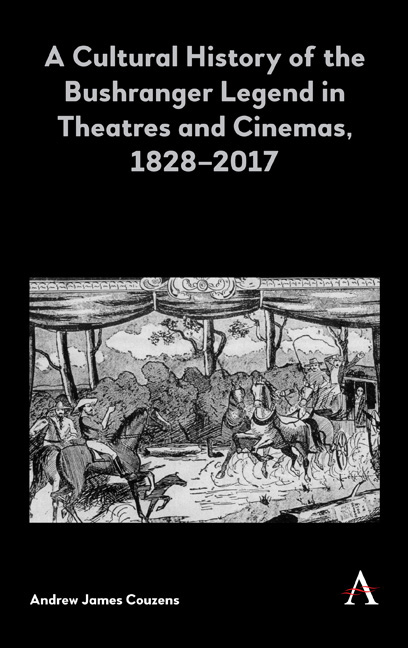Book contents
- Frontmatter
- Contents
- List of Figures
- Acknowledgements
- Introduction: Defining the Bushranger Legend
- Part 1 Establishing the Legend
- Part 2 Developing the Legend
- Part 3 Fragmenting the Legend
- 9 Historical Revisionism and the Bushranger Legend
- 10 Diversification and Inclusiveness of the Bushranger Legend
- 11 Globalization of the Bushranger Legend in Outlaw Road Movies
- Conclusion
- Bibliography
- Index
11 - Globalization of the Bushranger Legend in Outlaw Road Movies
from Part 3 - Fragmenting the Legend
Published online by Cambridge University Press: 14 February 2019
- Frontmatter
- Contents
- List of Figures
- Acknowledgements
- Introduction: Defining the Bushranger Legend
- Part 1 Establishing the Legend
- Part 2 Developing the Legend
- Part 3 Fragmenting the Legend
- 9 Historical Revisionism and the Bushranger Legend
- 10 Diversification and Inclusiveness of the Bushranger Legend
- 11 Globalization of the Bushranger Legend in Outlaw Road Movies
- Conclusion
- Bibliography
- Index
Summary
The post- Bicentenary period also saw a shift in the emphasis the Australian film industry took towards production emerging from commercial trends in the Australian film industry seeking an outward- looking cinema that engaged with a globalized marketplace. Two events signalled this shift. The first was the opening of Village Roadshow Studios at the Gold Coast, a joint endeavour between Australian production and distribution company Village Roadshow and American studio Warner Brothers. Secondly the introduction of publicly financed investment fund the Film Finance Corporation (FFC) provided an alternative focus for government financing to the AFC that emphasized returns on investment. For the FFC, the ‘fierce national debates about native title, frontier massacres and the Stolen Generations had little direct impact on the Australian film industry where public funding of feature films and mini- series was driven by commercial criteria’. This approach even influenced films like Gregor Jordan's Ned Kelly, which could both reflect local debates as described in Chapter 9 and position itself for international release. The film's sanitization of the Kelly legend was partly a result of this international positioning as the large budget and involvement of American studio Universal necessitated broad, international appeal. Much of the legend's local flavour was therefore lost, leaving behind a universal social bandit narrative set in Australia. The gang became more global in their outlook with the film foregrounding Byrne's knowledge of Cantonese and the presence of Chinese people in the colony. Similarly the parody Reckless Kelly set almost half its action in the United States. The increasingly global production contexts for these Kelly films and others results in works positioned for consumption in Asia and America as well as domestically.
Ben Goldsmith sees these shifts as indicative of a change in focus for Australian cinema to an international orientation that has fractured the relationship between cinema and nation in a very different way to that described in the prior two chapters. He cites foreign filmmakers, particularly Hollywood producers, using Australian locations, personnel and facilities as well as the Australian filmmakers who have achieved an international career as evidence of the need to rethink the definition of a national cinema. He argues that ‘Hollywood is now well and truly a part not only of Australian screen culture, but also of Australian national cinema’.
- Type
- Chapter
- Information
- Publisher: Anthem PressPrint publication year: 2019



